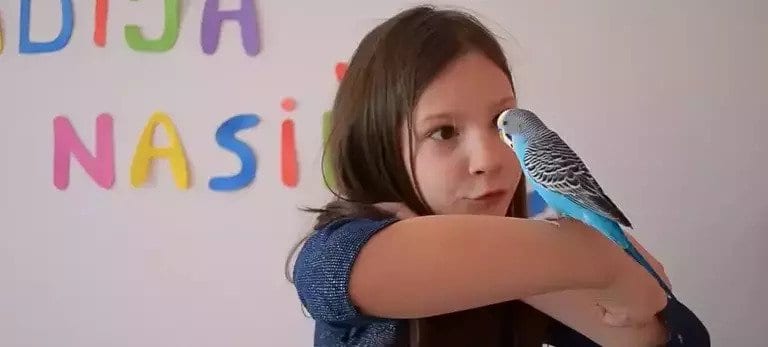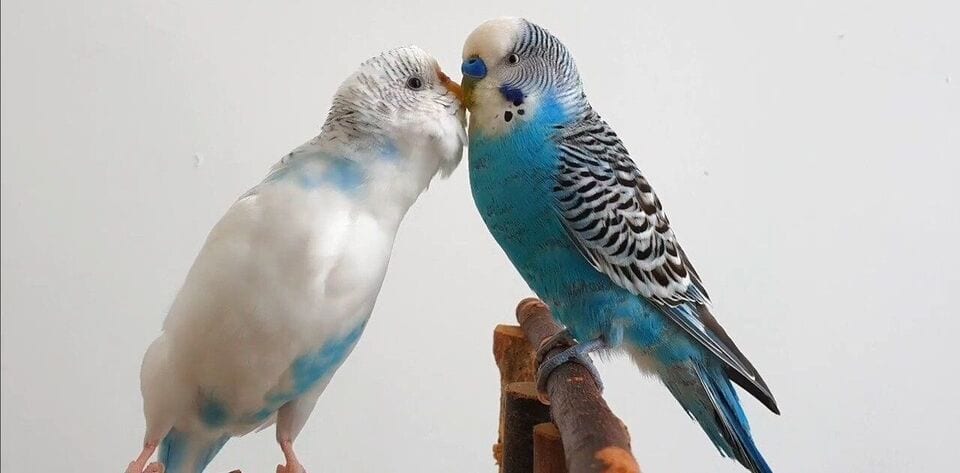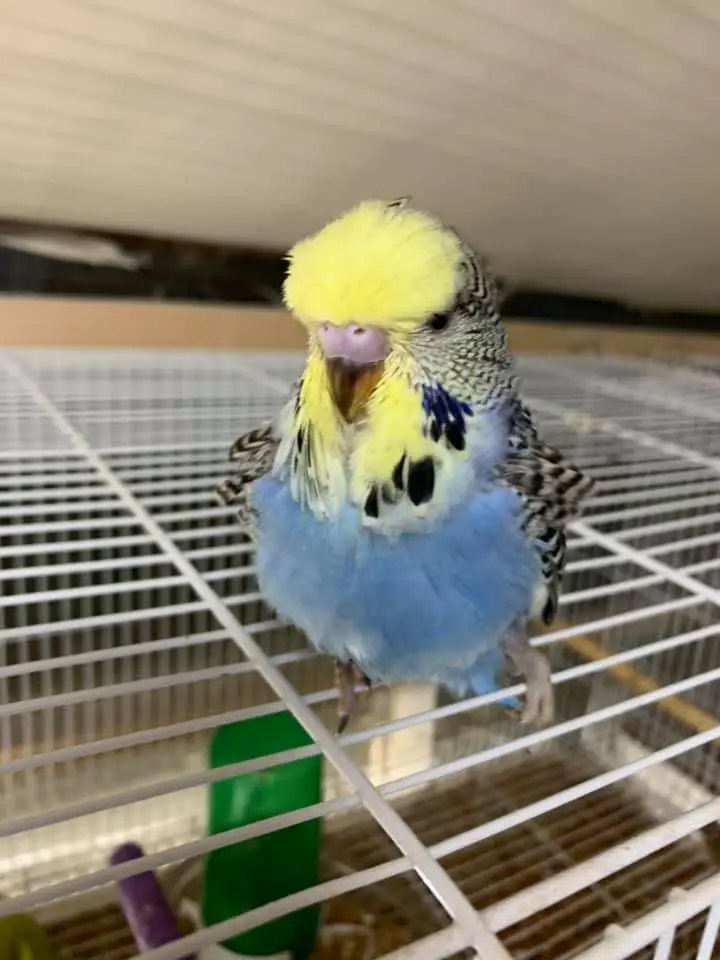
It’s a very exciting time when the family decides to bring an animal into the family. The children think about how much fun they’re going to have playing with their new pet and training it and spending lots of time with it, and mom and dad think about the cleaning of it and the more practical side.
A budgie can really make an incredible addition to a family. Often people think that is a budgie is just ‘a bird’ but there is a lot more to this colourful, feathered avian than meets the eye.
Budgies are intelligent, emotional, and affectionate. They want to play and they enjoy attention. They want to be stimulated and learn new things.
As a pet, budgies are low maintenance and they are perfect for a child who is looking for an animal to bond with.
It is hardly surprising then, that around the world, budgies are the third most popular pet.
Here are 5 reasons why budgies are great pets for children.
1. Budgies love their humans

Budgies just look so cute and cuddly, but does that mean they are good with children?
Budgies are of course, not like a kitten or a puppy that you can pick up and smother and hold tightly to your chest. They have little bodies and little bones and do need to be handled carefully.
Teaching children to handle small animals, or any animals, carefully and with respect is a great lesson to be learned early on.
As budgies grow, they are not held and smothered by their parents so they actually do not like to be cuddled. This is a very unnatural thing for budgies and it might frighten them.
Naturally, budgies will cuddle and snuggle up together especially when it is cold. They are not good at regulating their own body temperatures so this is a very natural thing for them to do.
However, with that being said, they do enjoy being with you. Their way to show affection to you is to sit on your shoulder or on your finger. If they are cold and are sitting on you, they will do the same thing and nestle near your arm or under your hair. Anywhere that it is warm.
If they have been hand-reared they will be more accustomed to human touch and will enjoy soft scratching on their head and neck.
Other places that budgies like to be touched are behind their beak, on theirs cheeks and around their ears. They will most likely allow you to gently scratch them here first before allowing you to scratch them on the head and neck.
Do budgies like to be kissed?
Budgies ‘kiss’ each other when they are preening. However it is not advisable for you to let your budgie kiss you on the lips as their saliva might contain the bacteria Psittacosis, which can be spread from birds to humans.

Psittacosis, or ornithosis, affects the lungs and may even cause pneumonia. It can be serious if left untreated so rather be safe and do not let your birds kiss you, or your children on the mouth. If they do want to kiss, train them to kiss you on the cheek instead.
Do budgies like to be blown on?
Budgies blowing on one another is called chuffing. This is their way of giving a kiss. If you are going to do it, just blow on them gently.
Spraying your budgie with water
Place a wide bowl of water in your bird cage to allow your budgie to bath at his leisure. Many budgies also enjoyed getting sprayed with water. Children enjoy spraying budgies as well, and watching their happy reaction. Purchase a gentle mister.


HOMENOTE Misting Cooling System
and spray your bird lightly. Some birds will take to the cool, fine drizzle immediately, others might take a bit longer. Some not at all.

Don’t force it. If you budgie looks stressed, stop doing it and try again the following day.
2. Budgies Don’t Really Make a Big Mess
A budgie’s digestive system is designed that it will poop approximately every 12 – 15 minutes so you will need to do a little bit of cleaning after they’ve enjoyed their free flight and have settled back into their cage.
The good news is that it doesn’t smell and it is very easy to clean.
Teach your child to be responsible for their pet and show them how to clean it up and that it is easier to clean it when it’s still fresh.
It is a good idea to keep paper towel close to the cage or in the flight room so it is readily accessible.
You can simply wipe up damp poop with the paper towel or if it’s dry you can vacuum or easily sweep it up.
3. Budgies Recognise Their Owners
Budgies are intelligent birds, and spending time bonding with them, will lead to them trusting you and wanting to spend time with you. Essentially you become part of their flock.
If the budgie is your child’s pet, teach your child to spend valuable time with his new pet every day to ensure that bond is created. If your child doesn’t do this, your budgie will create a bond with the next person who spends time with it.
Budgies can distinguish people from one another and will recognise you even if you enter a room full of people. Your budgie will fly to you because he trusts you. If you go away for a period of time, your budgie will recognise you on your return, although he might not leave you alone for a while incase you disappear again!
Budgies learn to recognise your face and your voice. If you change your clothes or your hair colour, or wear glasses or a bicycle helmet for example, they will still recognise you but might be a bit more hesitant in coming to you as now you’ve essentially ‘changed your feathers.’
If you notice your budgie doesn’t come to you when you are wearing bright blue for example, change the colour of your clothing when you are interacting with him.
Let your child have fun with this and walk into the room with some other family members and see who the budgie goes to. If the bird flies to someone else, encourage your child to spend more time with their bird and enhance their bond. (Even slipping in a few treats for your child to feed your budgie won’t hur their bonding!)
Budgies are not dangerous
Just like any animal, when a budgie is stressed or scared, he might react by biting.
Budgies usually give off signs before they bite, like backing away from you, they might warn you with a lot of chattering, opening their beak and sometimes they will even flatten their tail feathers.
Like any animal, a budgie can control the strength of his bite and this can be painful but generally their jaw pressure is not strong enough to do any serious damage. For a child however, the bite could break their skin.
If your budgie does bite you, try and not to scream and yell at it, or wave your arms around frantically. Talk to him calmly and put him back on his perch for a time out. Approach him slowly next time and interact according to his cue.
If you are getting a budgie for your child, one of the best things that you can do for your child (and your budgie), is teach your child how to respect this new addition to your family. They need to know that animals are fragile, that they can feel pain and they can get spooked easily.
Just like a cat might scratch or a dog might jump, a budgie might bite.
If your child treats the budgie with kindness, love and respect and spends a lot of time bonding, playing and training the budgie, there shouldn’t be many problems.
4. Budgies Don’t Die Easily
The most common cause for a budgie to die suddenly is night fright. If you find that in the morning your budgie has died, it is most likely because of this.
Night fright is when your budgies are suddenly spooked during the calm of the night, even if their cage is covered. It could be because of a loud noise, like thunder or a truck rumbling by.
It could be due to lights, like flashlights of a car, a waft of cool air, a cat taking an interest in your bird, or even mice searching the floor of the cage for food.
In the wild, budgies forage on the floor and their natural instinct when there is danger is to fly away. When everything in nature goes silent it is a natural sign that there is potentially danger around. When a sudden sound or light breaks this silence, your budgie will naturally try and fly away from the perceived threat, but as he is in his cage he will most likely knock into the roof of the cage sending himself into a panic where he will start flapping about and knocking into perches, toys and even other birds. This will set any other birds off as well.
Teach your child that the budgie also has a bedtime and make this part of their routine. Together you can find a suitable location for the cage to be overnight that is quite and won’t get disrupted by inside, and outside, noises.
5. Budgies are inexpensive
Budgies do not require a lot of things to live comfortable, healthy, happy lives with you.
The largest outlay that you will need to make is for their flight cage
Even the food that they require is not going to cost a lot of money.
Your child can use some of their pocket money, or do chores for extra pocket money, to buy treats or toys for their budgie every month.
When a budgie is not a good choice as a pet
It’s not really the budgie that would be the poor pet here. Budgies make excellent pets – they are small, relatively easy to take care of, affordable, easy to transport, intelligent and social.
However, sometimes getting a budgie isn’t the right fit for your lifestyle.
- 1. If you are a person who likes silence, rather look for a different kind of pet. Budgies are not loud but they chatter away constantly throughout the day.
- 2. Do you travel a lot? Don’t get a budgie if your work causes you to travel a lot. If your budgie has bonded with you, he will become sad with you leaving often and could start to avoid you on your return, or the polar opposite and never leave you alone.
- 3. They require regular exercise. Budgies were created to fly and they need to exercise their wings. If you don’t have the time, energy or patience to allow your budgie to fly around and exercise, then rather consider a different type of pet.
- 4. Budgies are social birds and need interaction. If you only get one budgie, you need to socialise with him and bond with him, in place of his flock. If you do not have the time to do this, rather don’t get a budgie. Alternatively, get more than one.
- 5. They can make quite a mess with flinging their food everywhere so either buy a cage that will limit this, or be prepared for regular clean-ups.
The Best Foods for Your Budgie
Most pet stores carry a huge range of bird food but know that buying a bag of budgie food will not provide your bird with the relevant nutrients that he requires to be healthy.
Safe foods budgies can eat
Budgies enjoy a wide variety of fruit and vegetables in their diets. Latest studies show that a budgie’s diet should be 40% fresh foods.
| Salad vegetables | lettuce, tomato, cucumber, celery and rocket. |
| Fruits | banana, strawberry, apples, grapes, nectarines, cherries (remove the pip), kiwis, blueberry, pear, oranges and peached. |
| Vegetables | carrot, peas in the pod, cabbage, cauliflower, sweetcorn and green beans. |
Grass and grains make up 50% of a budgie’s diet in the wild for mix a variety together for your birds and provide them with interesting meals.
A good idea is to provide budgies with sprouted seed
as they eat this in the wild.
The above is not a full list, so please do adequate research or chat to your avian vet about nutritional needs and quantities.
Calcium needs
Providing your budgies with cuttlefish provides a lot more enjoyment for them than adding a few drops of a calcium supplement to their water.
If you leave near the sea and find cuttlefish on the beach, they should smell of the sea and not carry an awful stench.
Before you give it to your birds, soak the cuttlefish in clean salt water for a day and then rinse it in clean water, and lastly leave in the sun to dry.
When your budgie is breeding you should provide additional calcium which will help your hen with the egg creation.
Protein needs
Budgies do require amino acids in their diets and the proteins
constructed from them for energy and healthy development.
Safe treats for budgies
One way to entice your budgie to play with you if he is being stubborn, or to bond quite easily with him, is if you are the ‘treat provider.’
Budgies love meal worms, alive or dried. They also love sprays of millet which you can get from the pet store.
This also assist with training them, so be mindful of how much you are feeding them so they don’t become overweight.
Getting your child involved in the feeding
If your child is young, you can draw up a feeding schedule with images of what their budgie needs to eat every day and how much.
Help them to measure out the foods and teach them what your budgie needs to eat to remain healthy.
Show your child how to put the food dishes and water into the cage safely without scaring their birds, and how to clean these dishes properly so that their birds don’t get sick.
If you grow your own fruit, vegetables and herbs you can show your child how to pick these fresh from your garden and prepare them for your budgie.
Is it cruel to keep one budgie?
Budgies by nature, are flock birds. In the wild they can live in flocks of hundreds so to keep one bird alone in a cage is unnatural for them and could have adverse effects on their social and emotional well-being, and they could become stressed if not receiving adequate attention. They are not large birds and are relatively inexpensive to keep so it is better for you to have at least two budgies living together. In the wild budgies play together and groom one another and chatter away noisily and all of this is part of their normal, social well-being. Having a minimum of two birds can provide for their social needs.
You can add a mirror to their cage to provide the illusion that they are living with a small flock and they will chatter to their reflection and nibble away at it, as if it were another bird.
Conclusion
Budgies can make great pets for children if they are happy and remain interested to put them time into this new relationship.
Generally speaking, when getting a new pet for a child, they are often extremely excited at first, absolutely promise to feed it and clean it and take really good care of it – but then the novelty does oftentimes wears off.
If this happens, you need to be prepared to step in and teach your child that they have a responsibility now and they need to spend time with their budgie as he likes to play and have friends, just as your child does.
Include ‘budgie time’ into your child’s daily schedule. Don’t call it a chore as chores are not fun and you don’t want your child to start believing that playing with their budgie isn’t fun.
When your child gets up in the morning or returns from school, they should have a scheduled minimum time to interact and bond with their bird. Anything over and above this is a bonus and your budgie won’t say no!
You will notice that in no time, they will be playing together and bonding well, and your child will be running home from school to play with their bird and in no time will be teaching their budgie new tricks too.


